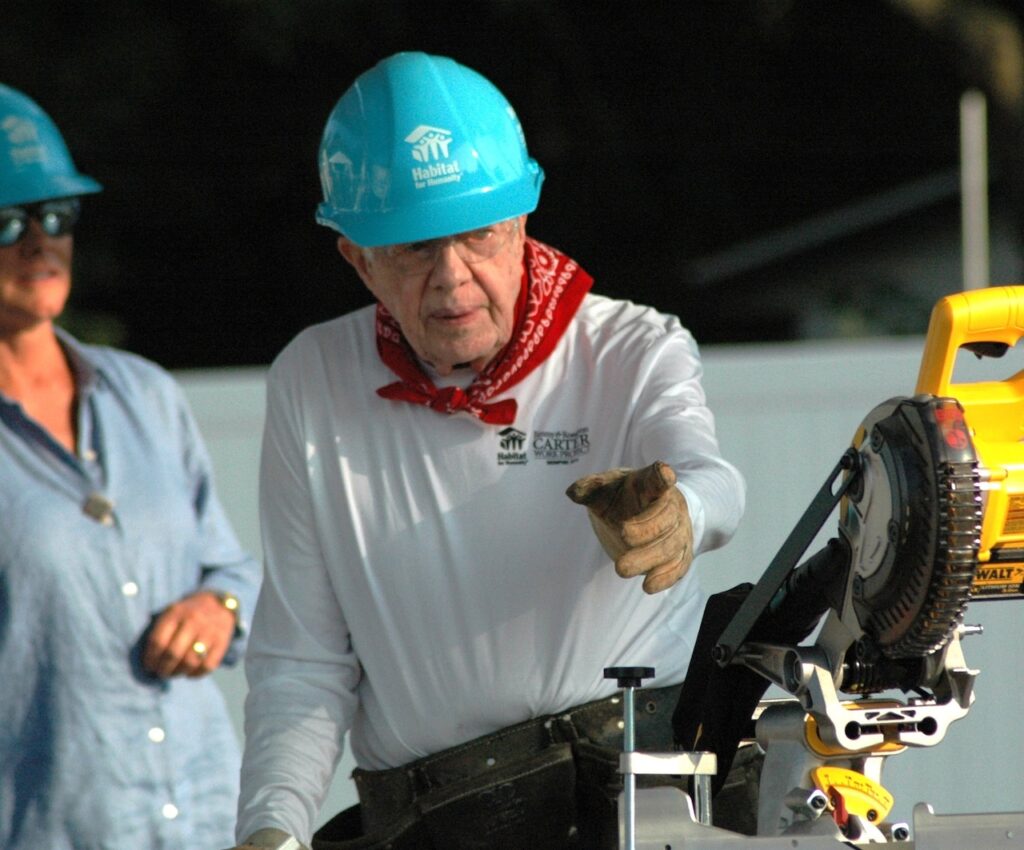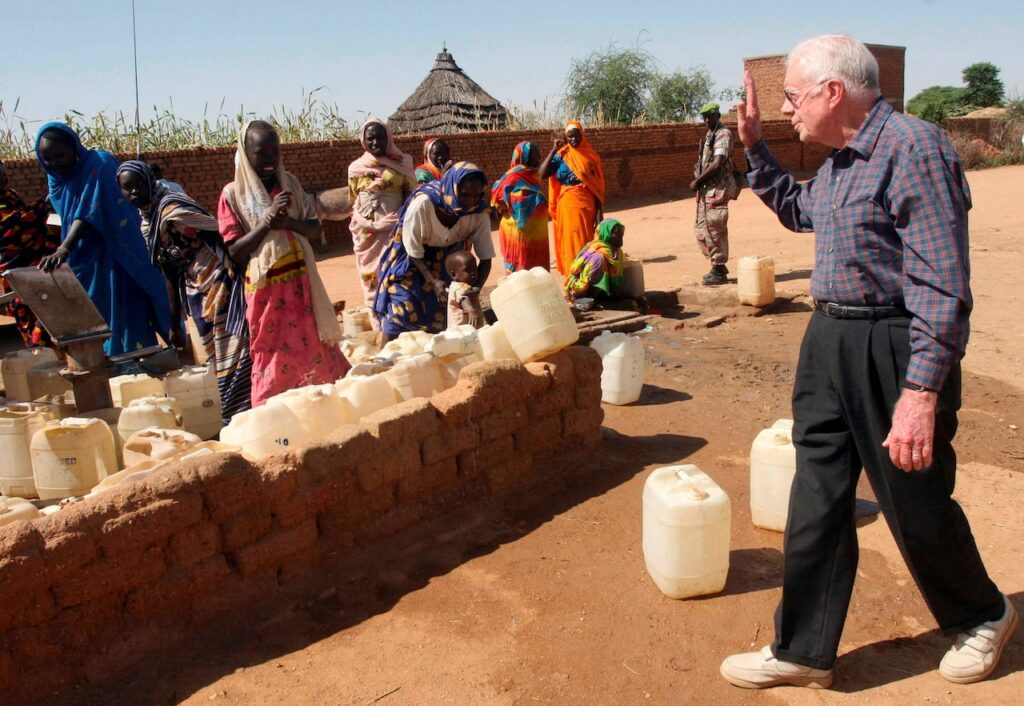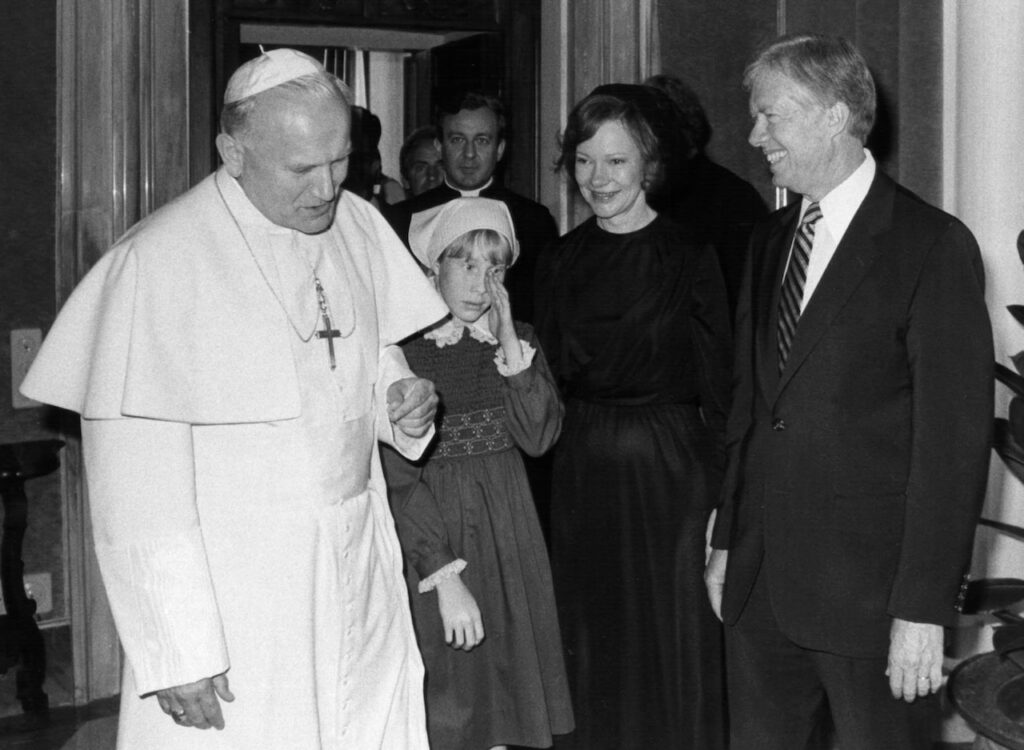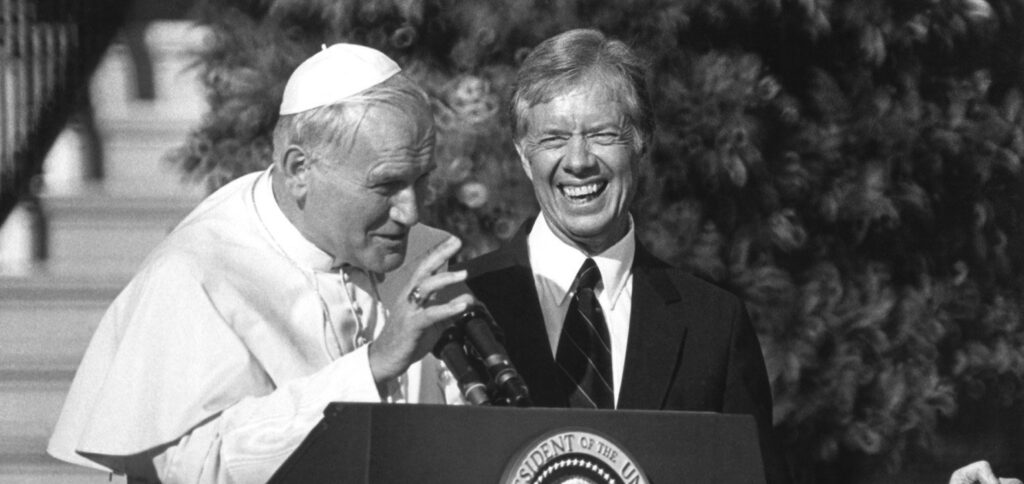WASHINGTON (OSV News) — Former President Jimmy Carter died Dec. 29 at his home in Plains, Georgia, his presidential library announced. At 100, Carter, who had been in hospice care since February 2023, was the longest-living U.S. president.
Carter, who served from 1977-1981 as the 39th U.S. president, was a devout Baptist, and faith played a large role in his life. He even taught Sunday school in his retirement. Carter was also the first U.S. president to host a pope at the White House.
“My father was a hero, not only to me but to everyone who believes in peace, human rights, and unselfish love,” Chip Carter, the former president’s son, said in a statement issued through the Carter Center. “My brothers, sister, and I shared him with the rest of the world through these common beliefs. The world is our family because of the way he brought people together, and we thank you for honoring his memory by continuing to live these shared beliefs.”
The Carter Center’s statement also said there will be public observances in Atlanta and Washington, D.C., in the late president’s memory, followed by a private interment in Plains. More information would be released in coming days, the statement said.
Archbishop Gregory J. Hartmayer of Atlanta said in a message of condolence to the Carter family that “President and Mrs. Carter exemplified the Christian faith.”
“Whether it was traveling the globe to advance democracy and champion human rights, or building houses with Habitat for Humanity and teaching Sunday school in Plains, Georgia, they made the world a better place,” Archbishop Hartmeyer said. “Among the many honors that President Carter received were the Presidential Medal of Freedom in 1999, and the Nobel Peace Prize in 2002. With Rosalynn at his side, he always used these opportunities to teach by example what (it) means to be a servant-leader. Through the work of The Carter Center, they will continue to inspire generations to come.”
“While the world mourns the passing of a tireless advocate for peace and justice and the nation, a much respected leader, the Carter family grieves the death of a father, grandfather and great-grandfather,” he added. “On behalf of the clergy, consecrated religious and lay faithful of the Catholic Archdiocese of Atlanta, I wish to express my sincere sympathy and deepest condolences to President Carter’s children, Jack, Chip, Jeff and Amy, and to their families. Rest assured of my prayers. May the Lord grant you his peace.”

On Feb. 18, 2023, the Carter Center announced that following “a series of short hospital stays,” Carter had “decided to spend his remaining time at home with his family and receive hospice care instead of additional medical intervention.”
“He has the full support of his family and his medical team,” the statement continued. “The Carter family asks for privacy during this time and is grateful for the concern shown by his many admirers.”
During his time in hospice care, Carter was able to partake in some activity, including attending funeral services for his late wife.
James Earl Carter Jr. was born Oct. 1, 1924, in Plains, Georgia. He graduated from the U.S. Naval Academy in 1946 and married Rosalynn the same year.
He later returned to Plains, worked in peanut farming, and entered state politics, becoming governor of Georgia before winning the Democratic nomination for president in 1976. He served a single term as president.
As president, Carter argued for a government that was “competent and compassionate,” prompting civil service and environmental reforms.

He lost his bid for a second term amid rising consumer costs and foreign policy setbacks, including the Iranian hostage crisis in 1979. His foreign policy accomplishments included the Panama Canal treaties, and a treaty between Egypt and Israel known as the Camp David Accords, per his official White House Historical Association biography.
In 2002, Carter was awarded the Nobel Peace Prize. In a statement at that time, the Nobel committee said Carter was awarded the prize “for his decades of untiring effort to find peaceful solutions to international conflicts, to advance democracy and human rights, and to promote economic and social development.”
After his presidency, Carter taught Sunday school at Maranatha Baptist Church in his hometown.
In a joint statement Dec. 29, President Joe Biden and First Lady Jill Biden said, “Today, America and the world lost an extraordinary leader, statesman, and humanitarian.”
The White House said Biden scheduled an official state funeral to be held in Washington for Carter on Jan. 9, with a National Day of Mourning the same day, and ordered U.S. flags to fly at half-staff for 30 days from the date of his death.
President-elect Donald Trump said in a statement, “The challenges Jimmy faced as President came at a pivotal time for our country and he did everything in his power to improve the lives of all Americans. For that, we all owe him a debt of gratitude,” Trump said. “Melania and I are thinking warmly of the Carter Family and their loved ones during this difficult time. We urge everyone to keep them in their hearts and prayers.”
The Carters were also advocates of Habitat for Humanity, building affordable housing as on-site construction volunteers. Jonathan Reckford, CEO of Habitat for Humanity International, said in a statement, “We are deeply saddened by President Carter’s passing, and our prayers are with the Carter family.”
“President and Mrs. Carter began volunteering with Habitat for Humanity near their home in southwest Georgia more than 40 years ago, and soon brought worldwide attention to the need for decent and affordable housing,” Reckford said. “We are grateful for the incredible impact the Carters have had on Habitat and on the families who have benefited from their shining example. The Carters put Habitat for Humanity on the map, and their legacy lives on in every family we serve around the world.”

Carter also had notable exchanges with Catholic leaders during his presidency. In a congratulatory telegram to Carter upon his election in November 1976, Pope Paul VI offered him “cordial felicitations,” adding he would pray Carter would lead the American people “in the way of authentic progress, true peace and fraternal concern, with liberty and justice for all.”
His inauguration featured faith leaders from multiple traditions, including a benediction given by then-Archbishop John Roach of St. Paul and Minneapolis.
During his administration, Carter hosted Pope John Paul II at the White House on Oct. 6, 1979, while the latter was on his first papal trip to the United States, making the pontiff the first pope to ever visit the White House – and striving together for a common future of peace and love – let us not wait so long for ourselves and for you to meet again. Welcome to our country, our new friend.” The pope responded by embracing the president.
Remarking on the White House meeting between the then-president and pontiff, Archbishop Hartmeyer said, “Their mutual respect and affection for each other continued throughout the years as they both championed peace and human rights.”
Carter later visited Pope John Paul II at the Vatican on June 24, 1980. During his visit to Italy, Carter also paid a visit to a Venetian monastery for prayers and breakfast.
“He wanted to know everything,” Father Gilíes Zaramella, the abbot, later told a news service. “He asked about all the paintings, the buildings, and talked to each of us individually and asked what we do.”

